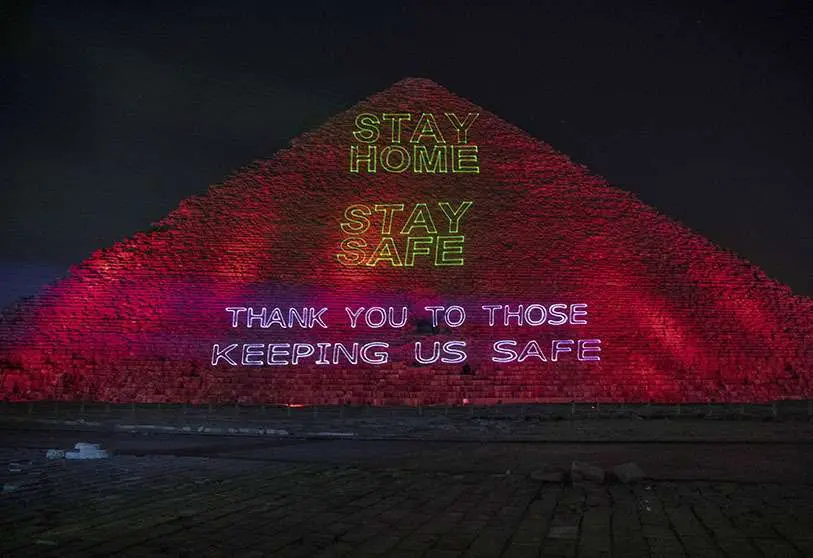Cairo, coronavirus and colony

With its 100 million inhabitants, Egypt is struggling to implement containment measures. Finding the right strategy, adapting to its different populations, its cultural particularities and the fragility of the most disadvantaged, and there are many of them. So how to do it? With Covid-19, we have understood that magic formulas and wishes have nothing to do with reality. Having adopted the policy of burying one's head in the sand, the world is waking up and everyone must find the right strategy not only in terms of health but also in terms of communication to manage the crisis. Silencing a city like Cairo is not easy. How can we imagine Cairo, even for a moment, without its crowded cafés, its carefree young people playing music on every corner, the hustle and bustle of children in Khân al-Khalili, that old and populous Fatimid quarter where day and night merge. How can we summon all these people to be silent together, at the same time and in record time? This is the hard task of Marshal Al-Sissi.
Covid-19 is on alert. And while we humans are no longer allowed to roam, the virus continues to gain ground. To contain its spread, Egypt has opted for a 7:00 p.m. to 6:00 a.m. curfew. This partial containment does not seem to solve the difficult equation of lowering the exponential curve of Covid-19's evolution. While trying to reassure the population, the death of two generals close to al-Sissi was like a bomb. In the most remote countryside of Egypt, it became clear that the virus could reach everyone, even the most privileged. The president himself had not been seen for some time and rumours were beginning to grow. Could al-Sissi be sick too? Were it not his closest aides who died? But now he has reappeared to silence the gossip. Al-Sissi has changed tactics and even ventured to take international action by sending two medical aid planes to Italy. The Italy abandoned by Europe and rescued by Cuba, China and Russia. Of course, Egypt's action was well received both outside and inside the country. It has also been criticised. Some consider it inappropriate at a time when Egyptians cannot find treatment in a completely flawed health system. Egypt appears to be maintaining a fragile balance. Maintaining its international image and facing an unprecedented crisis at home that it is struggling to contain. Al-Sissi is performing a balancing act.
Its Health Minister Hala al-Sayed wants to reassure himself by insisting in every press release that the situation is "under control". However, in the absence of any real official figures, recent statements by the Egyptian Ambulance Organization (EAO) do not point in that direction and leave no doubt about the seriousness of the situation. The EAO claims to have transported between 150 and 170 people with respiratory problems every day. The controversy over figures, true and false, is ongoing in Egypt. The slightest non-governmental information on this subject is punishable by law. For his part, John Jabbour, WHO representative in Egypt, stated that "85% of coronavirus cases in Egypt do not need medication and heal themselves" Information or contamination, the next few days will tell us.
Given the lack of information, the Egyptians decided to protect themselves and understood one thing: barrier measures are important and washing and disinfecting your hands is a recommendation that should be taken very seriously. So they turned to hydro-alcoholic solutions, which caused a shortage and caused prices to soar. The market was quickly flooded with adulterated products. But the Egyptians were used to system D and finding solutions to any problems. In a short time, in the land of the pharaohs, they quickly remembered the cologne in grandmother's closets. This Egyptian Proust madeleine is called 555 and its 70% alcohol content makes it a cost-effective disinfectant of choice. This is how the little shop that smells of the past came back to life. Long queues were seen along the street leading to the manufacturer 555 in front of the Egyptian Central Bank in Cairo. The capital's streets smell of cheap cologne again, like in the 1920s...
Cairo is changing as the days go by. A totally new situation: the muezzin calls for prayer, but without waiting for an answer. For more than a week, it has been forbidden to pray in the mosques, but also in the churches. In Egypt 10% of the population is Christian and is preparing to celebrate Easter. Here too it is time to pray in silence and to distance oneself socially. The Egyptian Orthodox Church has confirmed the suspension of prayers during Holy Week (12-19 April), which is considered the most sacred ritual for this community of 10 million souls. So, churches and mosques are lining up in the fight against the coronavirus. While the places of worship are closed, everyone is invited to meditate at home.

